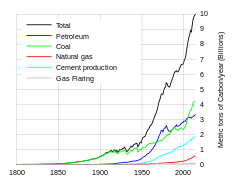Setting temperature rise goals
Limiting the average global surface temperature increase of 2°C (3.6°F) over the pre-industrial average has, since the 1990s, been commonly regarded as an adequate means of avoiding dangerous climate change, in science and policy making.[13][14] However, recent science has shown that the weather, environmental and social impacts of 2°C rise are much greater than the earlier science indicated, and that impacts for a 1°C rise are now expected to be as great as those previously assumed for a 2°C rise.[11] In a July 2011 speech, climate scientist Kevin Anderson explained that for this reason, avoiding dangerous climate in the conventional sense is no longer possible, because the temperature rise is already close to 1°C, with effects formerly assumed for 2°C.[15][16] Moreover, Anderson's presentation demonstrates reasons why a temperature rise of 4°C by 2060 is a likely outcome, given the record to date of action on climate, economic realities, and short window of time remaining for limiting the average surface temperature rise to 2°C or even 3°C.[15] He also states that a 4°C rise would likely be an unstable state, leading to further increases in following decades regardless of mitigation measures that may be taken.[15]
The consequences of failing to avoid dangerous climate change have been explored in two recent scientific conferences: the 4 degrees and beyond climate change conferenceheld at Oxford University in 2009; and the Four Degrees Or More? Australia in a Hot World held at the University of Melbourne in July 2011.
Symposium on avoiding dangerous climate change
In 2005 an international conference called "Avoiding Dangerous Climate Change: A Scientific Symposium on Stabilisation of Greenhouse Gases"[17] examined the link between atmospheric greenhouse gas concentration, and the 2 °C (3.6 °F) ceiling on global warming thought necessary to avoid the most serious effects of global warming. Previously, this had generally been accepted as being 550 ppm[18]
The conference took place under the United Kingdom's presidency of the G8, with the participation of around 200 'internationally renowned' scientists from 30 countries. It was chaired by Dennis Tirpak and hosted by the Hadley Centre for Climate Prediction and Research in Exeter, from 1 February to 3 February.[19]
Objectives
The conference was called to bring together the latest research into what would be necessary to achieve the objective of the 1992United Nations Framework Convention on Climate Change:
- to achieve, in accordance with the relevant provisions of the Convention, stabilization of greenhouse gas concentrations in the atmosphere at a level that would prevent dangerous anthropogenic interference with the climate system.
It was also intended to encourage further research in the area. An initial assessment of the subject had been included in the 2001IPCC Third Assessment Report; however, the topic had received relatively little international discussion.[20]
Specifically, the conference explored three issues:
- For different levels of climate change what are the key impacts, for different regions and sectors and for the world as a whole?
- What would such levels of climate change imply in terms of greenhouse gas stabilisation concentrations and emission pathways required to achieve such levels?
- What options are there for achieving stabilisation of greenhouse gases at different stabilisation concentrations in the atmosphere, taking into account costs and uncertainties?[21]










0 comments:
Post a Comment